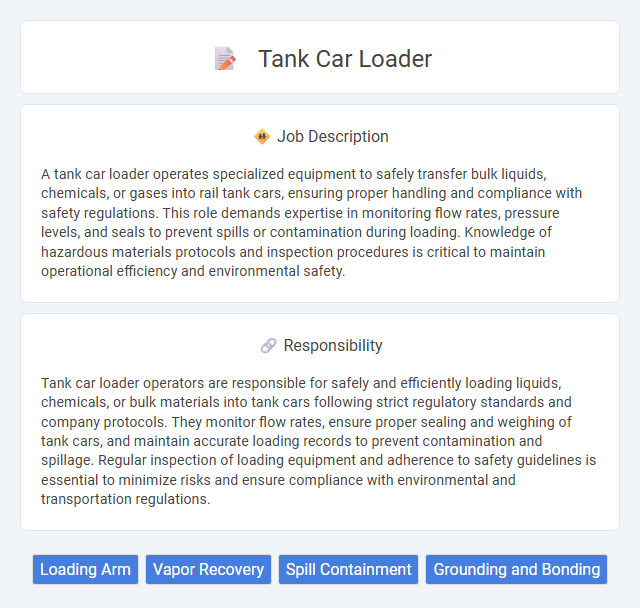
A tank car loader operates specialized equipment to safely transfer bulk liquids, chemicals, or gases into rail tank cars, ensuring proper handling and compliance with safety regulations. This role demands expertise in monitoring flow rates, pressure levels, and seals to prevent spills or contamination during loading. Knowledge of hazardous materials protocols and inspection procedures is critical to maintain operational efficiency and environmental safety.
Individuals with good physical stamina and attention to detail are likely suitable for a tank car loader job due to the demanding nature of handling heavy equipment and hazardous materials. Those prone to fatigue or with sensitivity to chemical exposure may face challenges in maintaining safety and efficiency. A background in industrial or mechanical environments increases the probability of successful adaptation to this role.
Qualification
A Tank Car Loader must have a high school diploma or equivalent, with specialized training in hazardous materials handling and safety protocols. Proficiency in operating loading equipment and knowledge of tank car specifications are essential to ensure accurate and safe transfers. Strong attention to detail, physical stamina, and compliance with OSHA and DOT regulations significantly enhance job performance and safety standards.
Responsibility
Tank car loader operators are responsible for safely and efficiently loading liquids, chemicals, or bulk materials into tank cars following strict regulatory standards and company protocols. They monitor flow rates, ensure proper sealing and weighing of tank cars, and maintain accurate loading records to prevent contamination and spillage. Regular inspection of loading equipment and adherence to safety guidelines is essential to minimize risks and ensure compliance with environmental and transportation regulations.
Benefit
Working as a tank car loader likely offers significant benefits such as competitive wages and opportunities for overtime pay due to the nature of shift work. Employees probably gain valuable hands-on experience with industrial equipment and safety protocols, enhancing their skill set for future career growth. The job might also provide a stable work environment with potential access to benefits like health insurance and retirement plans.
Challenge
Tank car loader jobs likely involve significant challenges related to handling hazardous materials and ensuring precise loading procedures to prevent spills or accidents. Workers probably face high-pressure environments requiring strict adherence to safety protocols and attention to detail. The probability of encountering mechanical issues or tight schedules may also increase job complexity and stress levels.
Career Advancement
Tank car loader positions offer foundational skills in industrial operations, critical for advancing to roles like equipment operator or safety supervisor. Mastery of loading protocols and adherence to safety regulations provide a competitive edge for promotion within logistics and manufacturing sectors. Continuous training and certification opportunities support career growth and increased responsibility in supply chain management.
Key Terms
Loading Arm
The tank car loader operates and maintains the loading arm to ensure safe and efficient transfer of liquids or gases into rail tank cars. Precision in controlling the loading arm is critical to prevent spills, reduce environmental risks, and meet regulatory compliance such as EPA and DOT standards. Expertise in monitoring pressure, flow rates, and secure coupling connections enhances operational safety and minimizes downtime during bulk liquid loading processes.
Vapor Recovery
Tank car loader operators specialize in loading hazardous liquids while ensuring environmental safety through advanced vapor recovery systems. These systems capture and recycle volatile organic compounds (VOCs) emitted during the loading process, significantly reducing air pollution and compliance risks. Expertise in vapor recovery technology and adherence to EPA and OSHA regulations are critical for maintaining operational efficiency and workplace safety.
Spill Containment
Tank car loader operators play a critical role in spill containment by ensuring precise loading procedures that minimize the risk of hazardous material leaks. Utilizing advanced sealing techniques and containment systems, they prevent spills during the transfer of chemicals or petroleum products into railcars. Regular inspection and maintenance of loading equipment further enhance spill prevention and environmental safety compliance.
Grounding and Bonding
Tank car loader operations require strict adherence to grounding and bonding protocols to prevent static electricity buildup and reduce the risk of sparks during the loading process. Proper grounding ensures that static charges are safely dissipated to the earth, while bonding connects the tank car to the loading equipment, equalizing electrical potential and preventing hazardous discharge. Compliance with OSHA and NFPA standards for grounding and bonding is critical for safety and regulatory approval in hazardous materials handling.
 kuljobs.com
kuljobs.com